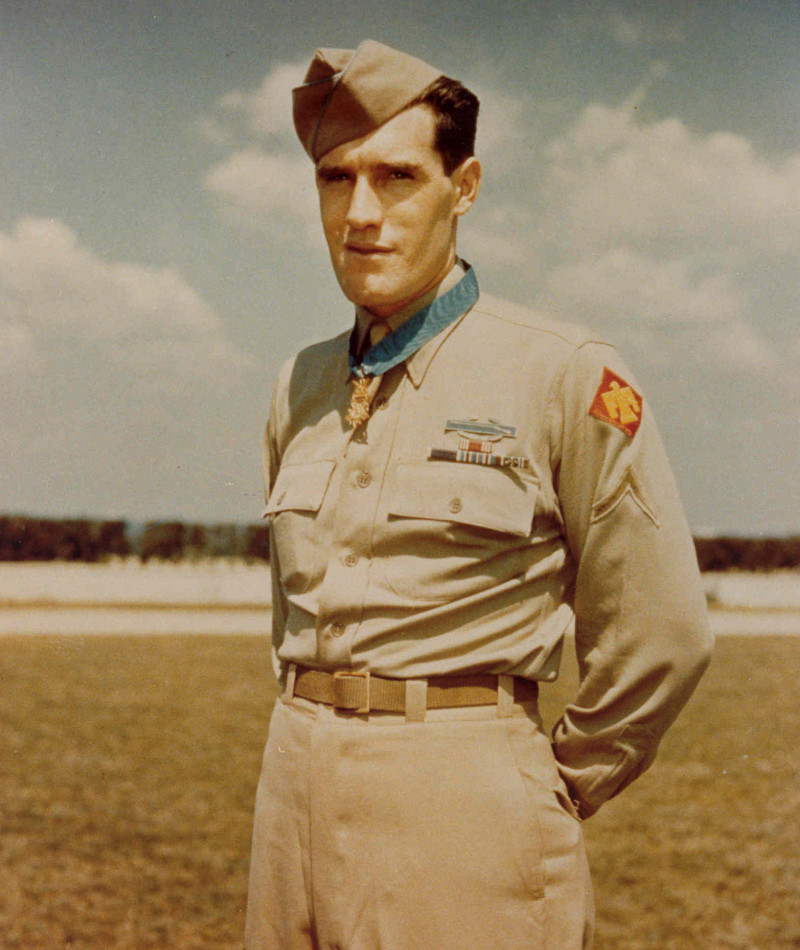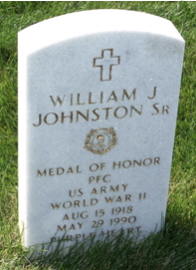J for Johnston
Private First Class William James Johnston, Sr.

Birth and Life
“Jimmy” as he was called by his parents and four siblings, was born on August 15, 1918, in Trenton, New Jersey. His parents, John and Mary (Watson) Johnston met in Toronto, Canada as immigrants from Great Britain and moved to New Jersey after their marriage. Then, in 1920, they moved to Hebron, Connecticut. In 1922, when Jimmy was 4 years old, his mother died, leaving five children aged 11 to 2 years of age. For a while in the 1930’s he lived in Colchester with Albert, Jenny and Elmer Foote as a “boarder” and later was reunited with his family in Hebron.
On August 8, 1942, Jimmy married Dorothy Clark in Colchester and they had four children: William, Jr., Dorothy, Diane and Donna. He worked for the State Treasury Department for the Veterans’ Bonus Division and was a commissioner of the Rocky Hill Veterans’ Home and Hospital. He also served on many Colchester boards and organizations.
Jimmy’s sister Elizabeth married Rubin “Ruby” Cohen on January 31, 1940. Ruby was an owner of “Harry’s Place” and a state legislator from Colchester. They also donated the Cohen Woodlands to the town of Colchester.
Medals, Awards and Honors
He was awarded the Medal of Honor* (the United States military's highest award for valor) as well as the Purple Heart (the award for those wounded or killed in the service of their country). On May 19, 1990, ten days before he died, Central Middle School in Colchester was renamed William J. Johnston Middle School in his honor for his valor and service in World War II.A section of Connecticut Route 16 between Colchester and Lebanon is also named in his honor.
Return to Colchester
Jimmy enlisted in the Army on March 23, 1943, and was discharged on September 9, 1944, as a Private FIrst Class. He was celebrated with Colchester’s largest parade.
Death and Burial
Private First Class William J. Johnston, Sr. died at age 71 on May 29, 1990. He is buried at the State Veterans Cemetery in Middletown, CT, in Section 72, Row F, Grave 17.
*Johnston’s Citation for the Medal of Honor
On August 30, 1944, Private First Class William J. Johnston was awarded the Congressional Medal of Honor by President Franklin D. Roosevelt.
“For conspicuous gallantry and intrepidity at risk of life above and beyond the call of duty in action against the enemy.”
Organization: U.S. Army, Company G, 180th Infantry, 45th Infantry Division
Place and date: Near Padiglione, Italy, 17-19 February 1944.
On 17 February 1944, near Padiglione, Italy, Johnston observed and fired upon an attacking force of approximately 80 Germans, causing at least 25 casualties and forcing withdrawal of the remainder. All that day he manned his gun without relief, subject to mortar, artillery, and sniper fire. Two Germans individually worked so close to his position that his machine gun was ineffective, whereupon he killed 1 with his pistol, the second with a rifle taken from another soldier.
When a rifleman protecting his gun position was killed by a sniper, he immediately moved the body and relocated the machine gun in that spot in order to obtain a better field of fire. He volunteered to cover the platoon's withdrawal and was the last man to leave that night. In his new position he maintained an all-night vigil, the next day causing 7 German casualties.
On the afternoon of the 18th, the organization on the left flank having been forced to withdraw, he again covered the withdrawal of his own organization. Shortly thereafter, he was seriously wounded over the heart, and a passing soldier saw him trying to crawl up the embankment. The soldier aided him to resume his position behind the machine gun which was soon heard in action for about 10 minutes.
Though reported killed, Pfc. Johnston was seen returning to the American lines on the morning of 19 February slowly and painfully working his way back from his overrun position through enemy lines. He gave valuable information of new enemy dispositions. His heroic determination to destroy the enemy and his disregard of his own safety aided immeasurably in halting a strong enemy attack, caused an enormous amount of enemy casualties, and so inspired his fellow soldiers that they fought for and held a vitally important position against greatly superior forces.
